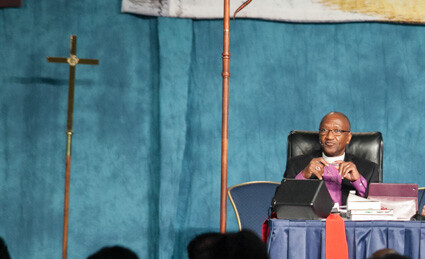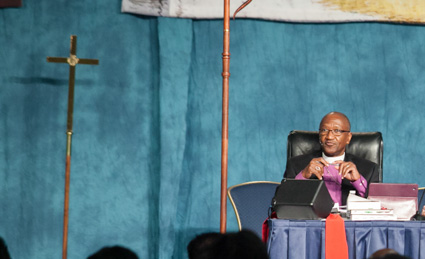
Bishop upholds resolution and process in two rulings of law (2)

by Melissa Lauber
UMConnection Staff
Baltimore-Washington Conference Resident Bishop Marcus Matthews has ruled on two questions of law that were presented at the 2014 Annual Conference.
The first, by the Rev. Stephen Ricketts of Providence-Fort Washington Charge in Fort Washington, was a request for a ruling regarding the conference’s voting procedures and process on five resolutions on human sexuality.
The conference voted, with a two-thirds majority, to suspend its rules so that it could use a holy conferencing process, called circles of grace, to discuss and vote upon the resolutions.
Rickets questioned if the voting “was legal and in compliance with the Book of Discipline since we did not have the chance to offer amendments.” He also claimed the “structure did not provide protection against discrimination.”
Bishop Matthews ruled that “the procedure and process used by the Annual Conference to vote on the five human sexuality resolutions was lawful and did not violate the Discipline.”
In his analysis, he noted that General Conference has empowered each annual conference to adopt rules and regulations for its own government so long as they are not in conflict with the Discipline.
“Nothing in the Discipline precludes an annual conference from adopting the commonplace parliamentary practice of allowing two-thirds of all members voting to suspend their own rules for a particular purpose, including obtaining conference action on resolutions of the type that were being presented for the body’s consideration in this instance,” the bishop said.
He also noted that every member of the annual conference who was present was given a chance to vote on all the resolutions, and so the circle of grace process was consistent with the United Methodist policy on the elimination of discrimination.
The second request for a ruling of law came from Matthew Sichel, a lay member from Wesley UMC in Hampstead, who asked if the resolution, “Agree to Disagree on Issues Pertaining to Gender and Sexual Minorities,” violated the Discipline or conflicted with the decisions of the Judicial Council.
Conference members had passed this resolution with a vote of 549 in favor and 304 opposed.
Sichel specifically questioned if the resolution was in compliance with paras. 2702.1(b), 2704.2(a) and 324.13 of the 2012 Book of Discipline and Judicial Council Decisions 1111, 1115, 1120 and 1218.
Bishop Matthews ruled that the Resolution “Agree to Disagree on Issues Pertaining to Gender and Sexual Minorities,” does not violate the Discipline, nor does it conflict with the decisions of the Judicial Council.
This resolution, the bishop pointed out, is aspirational. It uses such qualifying words as “encouraged to support” or “consider refraining” and does not have prescriptive force.
In addition, Bishop Matthew said, “the Judicial Council’s admonition against resolutions that ‘negate, ignore or violate the Discipline’ does not mean that an annual conference must stand silent when it decides, as a body, that its collective conscience is calling it to speak out, including by announcing its disagreement with provisions adopted by the General Conference, by advocating that the Discipline be changed, and by encouraging all Conference members, in the meantime, to be in ministry with all of God’s children.”
On June 26, Bishop Matthews submitted his ruling to the United Methodist Judicial Council for review, as required by the Discipline.
Complete copies of his two Rulings of Law can be found by clicking here.

Login/Register to leave comment